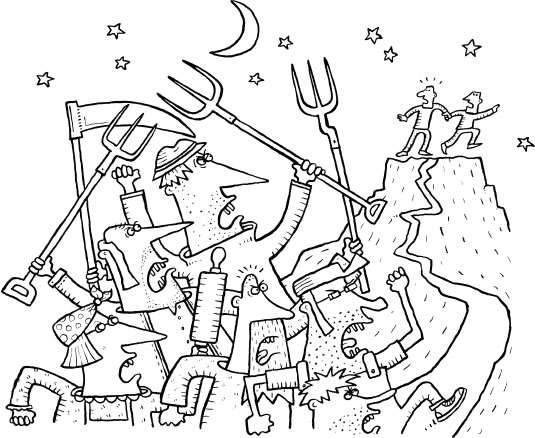

Aside from a bit of pesky self-loathing, there are more practical reasons why people might choose not to identify as lesbian, gay, bisexual or trans – or at the very least keep it under their hat. Depending on where you live and the faith you’re born into, circumstances can vary wildly. This section, although hardly filled with LOLs, I’m afraid, is really important because, although it’s pretty mega being a gay, it’s far from comfortable for thousands of people all around the world. And, who knows, we might be able to make a little difference.
What’s annoying is that homophobia is a cultural thing. In ancient times, people were super open minded about gay shiz. Look at Sappho on her island; check out the same-sex culture of the Greeks and Romans. I’m afraid the tide turned when Christian missionaries took it upon themselves to travel the world to tell everyone how marriage should be done. From there it was downhill all the way as far as the acceptance of homosexuality was concerned.
If you are reading this book in the UK (or pretty much anywhere in Europe or most of the United States), you should feel very lucky indeed because while bitchy haterz be throwing shade, at least you have the law on your side. As discussed, in the UK you are actively protected.
Although it seems unthinkable now, it was illegal to be gay in England and Wales until 1967, and Scotland didn’t wise up until 1981 (what were they thinking?). Northern Ireland dithered about until 1982. Before these dates, homosexual behaviour between men was considered a crime (‘gross indecency’) or a mental illness. In 1954, there were some one thousand men in PRISON for being gay.
That lesbian behaviour was never illegal is down to the assumption that two women could not commit ‘sodomy’, at least in the UK.
Let’s talk about ALAN TURING, a guy you really ought to be taught about in school. Basically, this total dude of a code-breaking genius won us the Second World War but was arrested in 1952 for being gay (again, ‘gross indecency’). He accepted CHEMICAL CASTRATION as an alternative to a jail sentence, before killing himself in 1954. Not cool.
A major step forward in equality was the change made to the age of consent. After much, MUCH ridiculousness, in which many politicians showed themselves to be flaming ignoramuses or plain homophobes, the age of consent for same-sex men (again men, as there had never been any rules in place for women) was lowered from twenty-one to eighteen and, FINALLY, in 2001, to sixteen. This meant the law recognised that you can’t have one set of rules for straight people and another set for those who aren’t.
With the equally baffling and frustrating fight for equal marriage now wrapping up at long last, the overt discrimination (as that is precisely what it is) is finally drawing to a close in the UK – but more on marriage later.
Basically, my friends, sometimes being LGBT* in the UK is a bit pants but, as you’re about to learn, it could be far, FAR worse …
We didn’t choose where we were born. We just popped out where our mother happened to be nine months after we were conceived. Similarly, we didn’t choose to be gay or bi – our same-sex attraction has been there for as long as we can remember. Likewise, trans people, more often than not, have always felt they weren’t in the correct body or at least felt an unease with gender norms.
In an ideal world, it wouldn’t matter where you were born OR what your sexual orientation is, but this total lottery is having a severe impact on people all over the world. The UK may have wised up over the past fifty years, but other countries are comparatively in the dark ages concerning LGBT* rights.
All aboard for what I call the TOUR OF SHAME – countries and territories where human rights are more like human wrongs (see what I did there?).
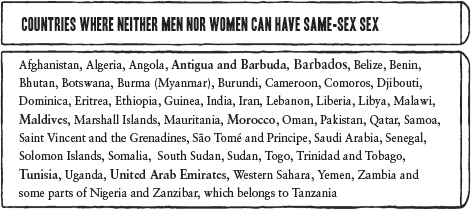
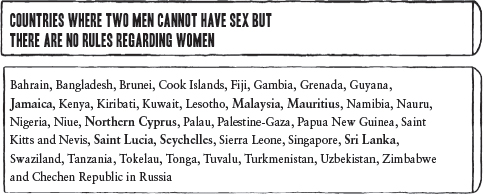
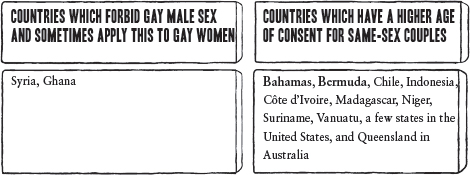
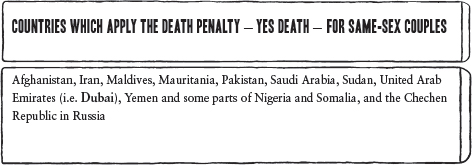
These tables are accurate as of winter 2013. With any luck, the lists will shrink all the time until there’s no need for this roll call of shame.
Countries DO change their stance; for example Mozambique recently decriminalised same-sex activity … Woo hoo! Pop and Party Rings for everyone. However, in December 2013, India went BACKWARDS and RE-criminalised same-sex activity. NO PARTY SNACKS FOR YOU, PARTY POOPERS.
However – and it’s a big however – just because any remaining countries have legalised same-sex behaviour doesn’t mean that it’s EASY to get your funky sex dance on without repercussions. In many places, Indonesia being a good example, it is legal to have same-sex sex, but people would face great hardship if they were ‘out’.
Furthermore, the vast majority of ‘legal’ countries still have all kinds of hideously homophobic legislation in place – no same-sex marriage or civil partnership, no adoption laws … many fail to provide even the most basic protection beyond, ‘It’s legal, what more do you want?’ Clearly, this isn’t good enough, and campaigners still have a long way to go.
It’s easy to think of gay-illegal places as being far, far away. Too far away to worry about. Well, how about Russia, where LGBT* groups are being persecuted despite their legal status? What about Greece, where gay men and female prostitutes are facing mandatory HIV testing against their will? These are our neighbours. Scary, scary stuff.
‘Bryan’, 21, lives in Singapore.
The situation in Singapore is very strange. Even though gay people are becoming more and more visible, we have no legal rights. We have Pink Dot SG, which is a bit like Pride and we have ‘Arts Venues’ which are places for gay people to meet up. I have never known anybody to be arrested but it is illegal for two men to have sex. I personally don’t understand it. Singapore is a beautiful and tolerant place, so it’s hard to understand why we don’t have laws to protect us.
The following table names countries with laws and rules protecting transgender people:
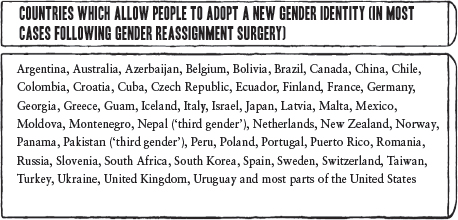
The situation for trans people is hugely unclear around the world – most countries have no clear laws covering the issue, which roughly translates as no protection for trans people. The above countries all have laws protecting you. However, as with LGB rights, many countries on the list might SEEM accepting but in reality things may be quite different. For instance many of the countries in the above box insist on sterilization before a new gender identity is granted. Be fair, I did warn you this section wasn’t exactly a barrel of laughs.
Personally, I don’t think it’s enough to be cross about the treatment of LGBT* people across the world. We have to do our little bit, right? For one thing, in the box of gay-illegal countries, I’ve emboldened places which are popular holiday destinations.
I think that a lot of LGBT* people think that because somewhere is tourist friendly, it’s gay friendly. This simply isn’t the case. Instead of Jamaica or Barbados, go to Grand Cayman. See? Easy. Do your homework.
Amnesty International: Challenges governments and authorities to fulfil their responsibility to protect LGBT* people from such abuses. The organisation campaigns to protect human rights defenders who put themselves at risk by speaking out against abuses based on sexuality or gender identity.
The Kaleidoscope Trust: Urges the British government, the Commonwealth, the European Union and others to use their power and influence to support the rights of LGBT* people. The trust works with parliamentarians, government ministers, officials and policy makers to try to effect real change in the lives of LGBT* communities around the world.
ILGA: ILGA’s aim is to work for the equality of lesbian, gay, bisexual, trans and intersex people and their liberation from all forms of discrimination. The group seeks to achieve this aim through the worldwide cooperation and mutual support of their members.
Stonewall: Stonewall is renowned for its campaigning and lobbying. Some major successes include helping achieve the equalisation of the age of consent, lifting the ban on lesbians and gay men serving in the military, securing legislation allowing same-sex couples to adopt, and the repeal of Section 28, (which prevented same-sex education in schools). More recently, Stonewall has helped secure civil partnerships and ensured that the Equality Act (2010) protected lesbians and gay men in terms of goods and services (for example, hotels can’t refuse you and your partner a room because you’re a same sex couple).
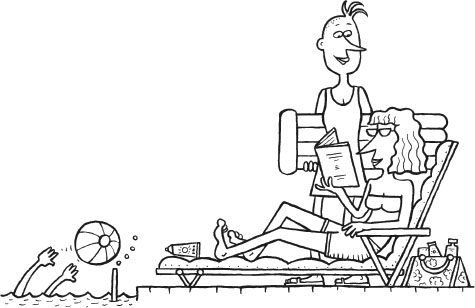
All four of these groups rely on donations. This means you need to jolly well stick your hand in your pocket and donate whatever you can. Some charities are listed in the ‘Helpful numbers and websites and stuff’ section at the back of this book.
You know when we said it’s not very nice when people say that ALL gay men are like this or ALL lesbians are like that? WELL, it’s similarly shoddy to claim that ALL Christians think like this or ALL Muslims think like that. Before we get into a discussion about what each of the main religions thinks about homosexuality, it’s important to state that all people of faith are individuals, more than capable of forming their own opinions away from scripture.
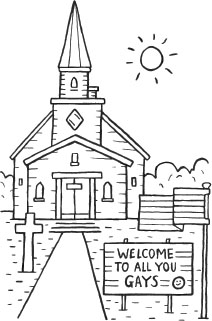
To be honest, most people of faith probably don’t give a flying fig about who you’re snogging – they’re probably worrying about their gas bill or whether they left their hair straighteners on.
However, although most religious people are somewhat progressive, there are individuals and regimes that insist on clinging to multi-thousand-year-old bits of paper in the name of hate. If you look back at the list of gay-illegal countries, they do tend to be the ones where the legal system is tied to a religious regime – not naming names but, like, you know, Saudi Arabia.
Before I tear some old religious stuff to shreds, I have faith that the vast, vast majority of religious people use (whichever) God’s teaching to find tolerance and love for all mankind. And also womankind (yeah, some religions are mega sexist too).
Most people of religion see their sacred texts as a general guide for life – moral guidance, as it were. The problem comes when a minority take the written words literally – and the meaning of some of these words may even have been misinterpreted. Sacred stories and poems were written down by humans hundreds of years ago and so may have errors or mistranslations or additions. It’s sort of like playing a game of Chinese whispers that’s lasted for centuries – some things are bound to get lost along the way.
The closest thing I personally have to a prophet is Madonna. Now what if I went around taking everything she said literally?
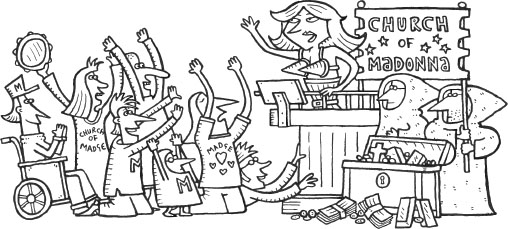
Look at the lyrics to ‘Express Yourself’ and ‘Material Girl’… contradictory at best, I’m sure you’ll agree!
Let’s take a look at the main world religions and examine their traditional views first on homosexuality, then transgenderism.
1. Hinduism and Buddhism
Let’s start with the positive. Hinduism and Buddhism are way chilled out about both homosexuality and trans issues. Hindu art depicts various figures engaging in same-sex acts, while the whole point of Buddhism is about being at one with the world, which, in this case, includes us.
Hurrah for Hinduism and Buddhism!
2. Christianity
As you know, there are various branches of the Christian church, and they each take a different stance on homosexuality. Here’s a best-fit guide:
So what’s the big problem? Well, it’s all about TRANSLATION and LANGUAGE. There are lots of translations of the Bible (the Christian holy book), and all of them are slightly different. The odd word here and there looks pretty bad for homosexuality. The issues stem from two key parts of the Bible. The quotes below are from the King James Bible, and I’ve put them in a SCARY FONT. No reason …
‘AND THEY CALLED UNTO LOT, AND SAID UNTO HIM, WHERE ARE THE MEN WHICH CAME IN TO THEE THIS NIGHT? BRING THEM OUT UNTO US, THAT WE MAY KNOW THEM.’ Genesis 19:5 (In this instance, ‘to know’ is thought to mean ‘to bum’.)
‘EVEN AS SODOM AND GOMORRAH, AND THE CITIES ABOUT THEM IN LIKE MANNER, GIVING THEMSELVES OVER TO FORNICATION, AND GOING AFTER STRANGE FLESH, ARE SET FORTH FOR AN EXAMPLE, SUFFERING THE VENGEANCE OF ETERNAL FIRE.’ Jude 1:7 (‘Strange flesh’ is thought to mean, in this case, ‘bum’.)
So what’s goin’ on here? In a nutshell, the towns of Sodom and Gomorrah used to be in the Jordan valley until divine judgement was passed and they were destroyed by heavenly fire. Sounds like an awesome episode of Buffy until you realise that people use this story to persecute people.
In some interpretations of the Hebrew text (versions of this story appear in the Torah, Bible and Quran) it’s thought the behaviour that displeased God so much was homosexuality.
This is WIDELY open to interpretation as we shall soon discover.
More eye-roll inducing admonition from the book of Leviticus:
‘THOU SHALT NOT LIE WITH MANKIND, AS WITH WOMANKIND: IT IS ABOMINATION.’ Leviticus 18:22
‘IF A MAN ALSO LIE WITH MANKIND, AS HE LIETH WITH A WOMAN, BOTH OF THEM HAVE COMMITTED AN ABOMINATION: THEY SHALL SURELY BE PUT TO DEATH; THEIR BLOOD SHALL BE UPON THEM.’ Leviticus 20:13
Way harsh.
So if you have the misfortune to stumble onto a literalist, homophobic Christian, how do you go about defending yourself? Knowledge is power, my friend.
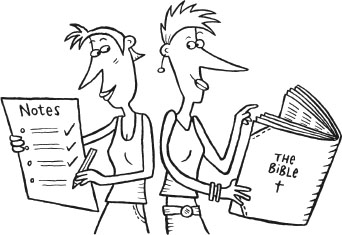
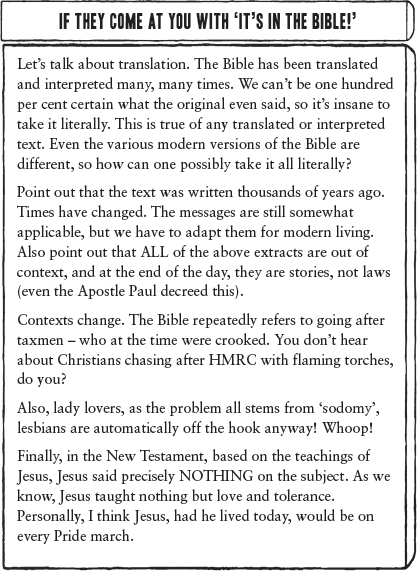
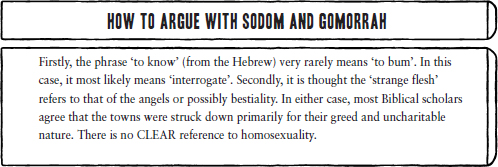
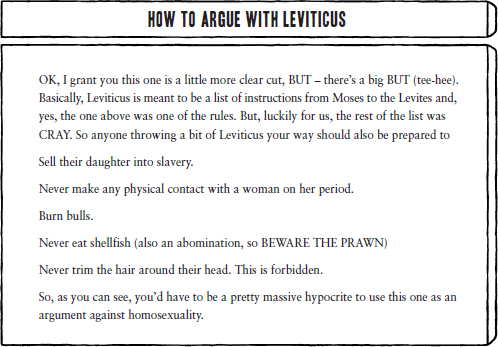
There’s some fairly convincing evidence of gay love IN THE BIBLE almost three thousand years prior to Queer as Folk. That’s right. In the book of Second Samuel, besties David and Jonathan may have been a little more than friends! Check it out:
‘I AM DISTRESSED FOR THEE, MY BROTHER JONATHAN: VERY PLEASANT HAS THOU BEEN UNTO ME: THY LOVE TO ME WAS WONDERFUL, PASSING THE LOVE OF WOMEN.’ 2 Samuel 1:26 (You go gurlz!)
And the gals were getting on board the sexy Bible love train too. The story of Ruth and Naomi reads like an episode of Desperate Housewives on crack – there’s a LOT of husband swapping – but some scholars read their journey as same-sex love.
Finally, there are various bits of the Bible that are conveniently missing – see the Gospel of Mary – so, as ever, we mustn’t wholly trust such ancient sources of information.
3. Islam
A little like the Bible, there’s not an awful lot in the Quran to explicitly forbid homosexual behaviour, although it also refers to the people of Sodom and Gomorrah, this time with a more explicit focus on rape, not homosexuality. Well, we already know how to respond to that story, don’t we.
The larger problem comes from the Hadith, or teachings of Muhammad. These are … erm … less ambiguous.
‘WHOEVER YOU FIND COMMITTING THE SIN OF THE PEOPLE OF LUT (LOT), KILL THEM, BOTH THE ONE WHO DOES IT AND THE ONE TO WHOM IT IS DONE.’ Sunan al-Tirmidhi.
Well, at least it doesn’t discriminate between the bottom and top.
The good news is that the Quran is on your side. NOWHERE in there does Allah state a punishment for homosexual behaviour. What’s more, the Quran actively encourages diversity, as Allah created that too:
‘O MANKIND! WE CREATED YOU FROM A SINGLE (PAIR) OF A MALE AND A FEMALE AND MADE YOU INTO NATIONS AND TRIBES THAT YE MAY KNOW EACH OTHER (NOT THAT YE MAY DESPISE EACH OTHER). VERILY THE MOST HONOURED OF YOU IN THE SIGHT OF ALLAH IS (HE WHO IS) THE MOST RIGHTEOUS OF YOU. AND ALLAH HAS FULL KNOWLEDGE AND IS WELL ACQUAINTED (WITH ALL THINGS).’ Yusuf Ali Quran 49:13
Regarding the Hadith, as with Leviticus, there are various rules that very few people would follow today – seduction by women is on a par with homosexual acts, so it would seem, as is drinking wine. I’m sure we wouldn’t kill people for these things. Moreover, the sharia law sets no specific punishment for homosexual behaviour – recommending the death penalty only be used for adultery, renouncing the faith and murder. Most Muslim countries don’t enforce these punishments (side eye at those who do).
4. Judaism
Not being funny, but these guys kinda started it. The parts of the Bible that deal with homosexuality came from the bits based on the Torah (the Pentateuch), so it’s pretty much the same story – the general negative feeling towards homosexuality comes from Sodom and Gomorrah and Leviticus, in this case called Vayiqra.
As with Christianity, there are many branches of the Jewish faith and, unsurprisingly, the Orthodox branch tends to be the most, well, orthodox. One of the most popular forms of Judaism, Reform Judaism, is way more chilled and doesn’t prohibit gay, lesbian or bisexual couples from entering the faith. So let’s all send them a cookie.
* * *
Apparently as a boy of around 4 or 5 years old there was an occasion in which I came home in tears from school – someone had told me that God didn’t exist.
As a child I was also known for my re-enactments of Disney films and performing Cher’s ‘Shoop Shoop Song’ for anyone that would sit around long enough to endure it; this led my parents to believe that I’d either be a Vicar or an actor (why actor and not Drag Queen I’m not sure, I’m told I played the part of Cinderella wonderfully). It turns out that I’m neither Vicar nor actor (nor Drag Queen, although I do have the legs for it) but I still retain that same faith I had 20-odd years ago.
I grew up not in a traditionally Christian family but we began to attend Church when we moved to Sussex shortly before my 9th Birthday and it soon became a very important part of my life and my development. Much of my free time as a teenager was spent volunteering with the children’s and youth work at our local Baptist Church and I had a close group of friends who would do the same. The painful irony was that they only knew just one aspect of me, no matter how much time we spent in each other’s company.
Growing up and from a young age knowing that you’re gay (I asked out my first “boyfriend” aged 10) yet being reminded fairly consistently that “God’s best is man and woman” is a damaging place to be. It causes many people to lose their faith, many to self-harm and many to take their lives. It’s a hurtful place that countless young people and adults’ alike still find themselves in today and the Church has a lot of work to do to make amends there.
However, this being said I consider myself to be in an incredibly privileged position now that I’ve come through those imposed dark places. I came to own my faith personally and not have it prescribed to me by dogmatic teaching; my Theological studies aided this journey and allowed me to realise I belong to two beautiful, charismatic, joyful and alive communities that in spite of their differences often look at life in just the same way.
Being a Christian who also happens to be gay, or being a gay man who also happens to have a faith, is often a troublesome path to tread, neither community really quite understanding how you can belong to both fully but I find it to be an incredibly energising adventure to be part of.
As a Christian I believe that God is love and where there is love God is there; one of the most loving communities I know belongs to “the gays” and so this is where I know God dwells.
– Luke
This one throws up more problems. Before we start, it’s worth noting that gender reassignment, as we know it today, wasn’t possible when the key holy texts were being written. Therefore there really isn’t a precedent for it. There are, however, a few passages on cross-dressing which have been skewed to encapsulate all gender dysphoria.
Paradoxically, Islam takes a fairly chilled view on this. There’s nothing specific in the Quran, and the Hadith takes issue only where ‘cross-dressing’ is used for prostitution (which isn’t a brilliant career option, let’s be honest, so they probably have a point). However, in some countries, gender reassignment surgery (often male to female) is seen as a ‘cure’ for homosexuality, which is a crime. This clearly isn’t ideal.
Christianity and Judaism have more defined and, indeed, negative views about gender reassignment. In Deuteronomy of the Old Testament (and similarly in the Torah), there appears the following passage:
‘A WOMAN MUST NOT WEAR MEN S CLOTHING NOR A MAN WEAR WOMEN S FOR THE LORD GOD DETESTS ANYONE WHO DOES THIS.’
Deuteronomy 22:5
There are also references to eunuchs (men with their sexual organs removed) not being able to enter the temple.
As with the passages that address homosexuality, trans people are more than able to defend themselves should the Bible or Jewish scripture be used to attack them. In the case of Deuteronomy, the text appears to refer to cross-dressing, not gender dysmorphia and, given the era it was written in, could actually be about practices of pagan fertility cults at the time. Furthermore, the eunuchs back then weren’t castrated to change gender; many were slaves who had their bits chopped off against their will. Once more we can see that many of the rules applicable to the people of biblical times simply aren’t relevant any more.
Finally, in the book of John, the author talks about Jesus’s inclusive view of those born with birth defects, and I think we can argue being born the wrong gender is indeed one such defect. I love it when you can actually use the Bible to argue in our favour.
Furthermore, the concept of third gender stems from Hindu teaching and philosophy. This category encompasses all genders that exist outside of simply male and female and is often legally recognised. In some cultures and rituals, members of the third gender are revered as having almost magical powers and are considered lucky. So, see, it’s not all bad, is it?
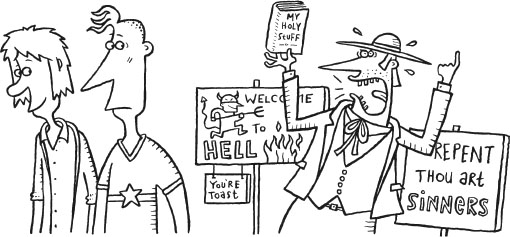
A dear friend once told me, ‘YOU CAN’T ARGUE WITH CRAZY.’ Someone else once said, ‘HATERZ GON’ HATE.’ Put these two pieces of wisdom together and you kind of have the situation we’re in. People using religion to hate LGBT* people are going to do so however well we argue our case. You’ll spout logic until you’re blue in the face and some homophobes will continue to hate.
I believe if you wanted to piece together a convincing argument about why steak and kidney pie was sinful, you would be able to use religious texts to help your campaign – they are old enough and vague enough to damn almost anything.
All we can do is rest assured that we are far from an abomination. Whether you believe in God as a creator or not, we were all born out of something very natural. We are one hundred per cent organic. Like orange juice with bits.